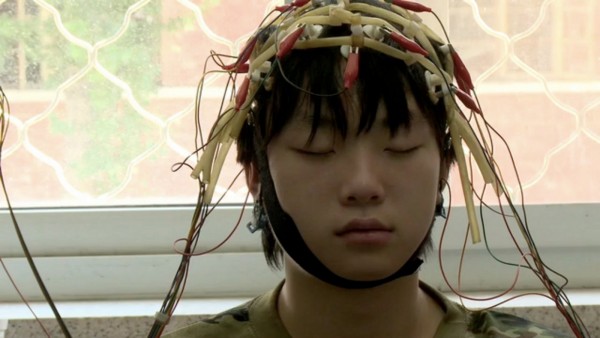INTERVIEW: ‘Web Junkie’ filmmakers document Internet addiction in China

The new documentary Web Junkie from directors Hilla Medalia and Shosh Shlam is a startling look into Internet addiction in China and the unconventional methods used to break teenagers of their gaming habits. The boys documented in the film, which played the Sundance Film Fesetival and is currently running at New York City’s Film Forum, are brought to a military-like facility called Daxing Boot Camp on the outskirts of Beijing. They are usually duped into the facility by their parents and then stay for a few months. The teenagers are yelled at by the staff, forced into military procedural situations, attend therapy sessions with their parents and bond with other Internet addicts.
World of Warcraft, a game of choice among the teens, is a world away.
Shlam recently told Hollywood Soapbox that she heard news on Australian television that one of the boys in an Internet-addiction boot camp was “beaten to death” (here’s a report from the Los Angeles Times from 2009). This gave her the impetus to start exploring the issue.
“When I thought to make a film about the dark side of the Internet, I thought that China would be the place because the Internet addiction in China is a very extreme phenomenon,” she said recently during a phone interview. “I contacted Professor Tao, asking him to make this documentary in the center … and he agreed for me to do it. So this is how I got the access. He believes in his theory, and he wants it spread out all over the world. So I think that this is the reason that he agreed because otherwise it was very complicated.”
For viewers in the United States, it will likely be discomforting watching teenagers so consumed with the Internet that they lose touch with reality. Also discomforting might be the unorthodox methods at the facility. “We wanted to film … a whole course of treatment, which is between three and four months,” Medalia said.
The filmmakers were surprised by what they found — from the boys being tricked by their parents to seeing the teens crying while trying to live without electronic devices. “An addict is if you are on the computer more than six hours not for studying or work purposes,” Shlam said about her research in China. “I mean we were surprised, yes, from the way the Chinese treat these children. It’s under very strict military discipline.”

She added: “Everything that we filmed [was] with the permission of the parents and the staff, but there were, you know, situations that they didn’t want us to do it. And, of course, it’s understandable. These parents are very helpless, very fragile. The situations are very difficult for them, so mostly it came from parents, sometimes from the staff in the beginning. In the beginning there was a nurse that brought like a schedule that went with us everywhere until we requested her to stop otherwise we will not continue to shoot this documentary.”
Medalia said that they were able to see the teenage boys go through the whole process — a process that the staff members said leads to success. “What happened is when the child gets into the center at the beginning, most of them were forced there,” Medalia said. “So at the beginning, they received a treatment, and they are very upset. … Slowly [they] accept that they are there, and they participate. And then at the end they form friends. … It’s hard for us to say how much success or not.”
Shlam said the “success” would be determined by the teenagers’ ability to function again in real life. Will these students go back to school? Will they keep their Internet game playing to a couple hours per day? No one is expecting them to never touch a computer’s keyboards again; social media and electronics have become too integral to life in 2014.
“These children that we met I mean stopped functioning,” Shlam said. “They drop off school. They don’t have relationship in reality. I mean all their world is in the virtual reality, so success is really to come back to reality.”
Shlam also said they were escaping from something in the real world, and they have a lot of loneliness in life. She offered that the strict and competitive education system in China could be a factor. But what came first? The Internet addiction or the problems?
“For me, I think that technology became an aspect of our intimacy,” Shlam said. “I think that we think that we are more connected, but at the same time we create a new solitude. I think that Internet changed human relationship. I’m concerned about it, and this is the reason that I went and wanted to make this film. I was not brought up on [the] Internet. I don’t belong to the Internet generation, so to speak. So [to] me it was very important to investigate this phenomenon and to meet those people.”
Medalia said she is connected and dependent on technology, and sometimes she wonders where the line is and whether she crosses it herself. “I buy the safest car seat for my baby, but yet I must check my e-mail every minute when I drive or text,” Medalia said. “It’s a very interesting phenomenon to see the young generation, how they are using the technology and how the technology also affects and changes our life.”
And, in case American audience members thought this was an exclusive problem in China, here’s what Shlam concluded: “We see this film as a Chinese story, but also China is a mirror to what the western world is facing,” she said. “Yes, the boot camps are in China. Maybe in other countries they will find another solution.”
By John Soltes / Publisher / John@HollywoodSoapbox.com
-
Click here for more information.

